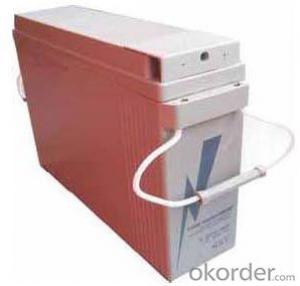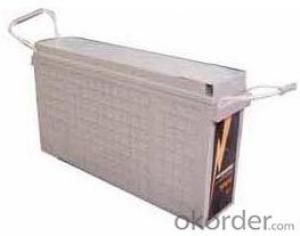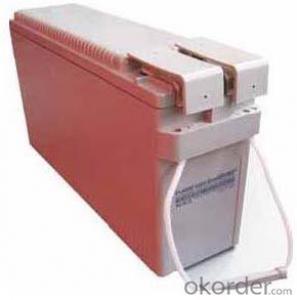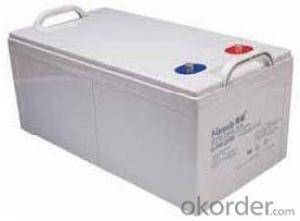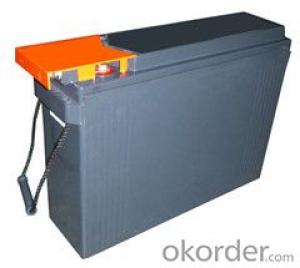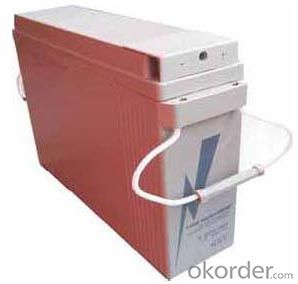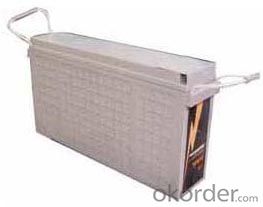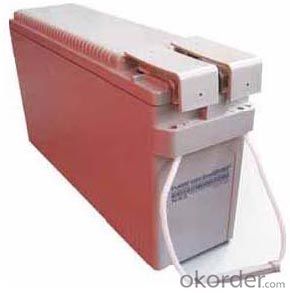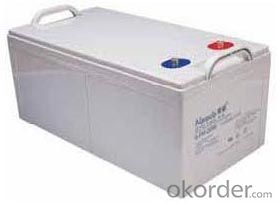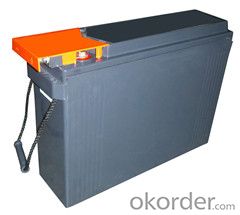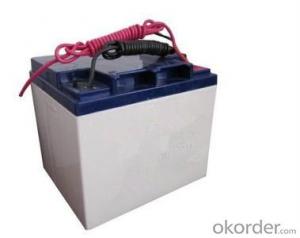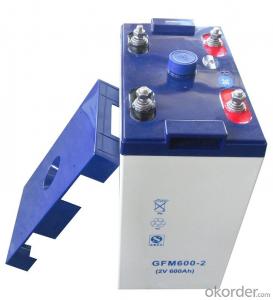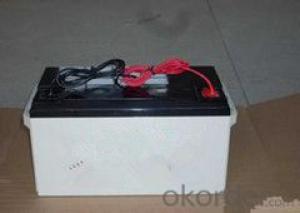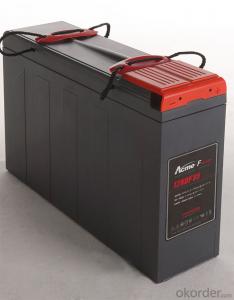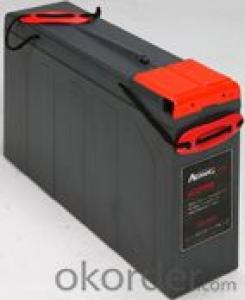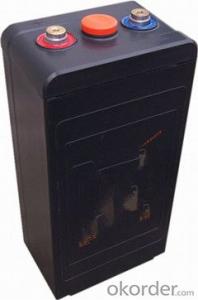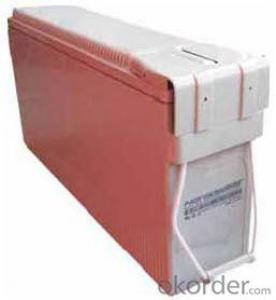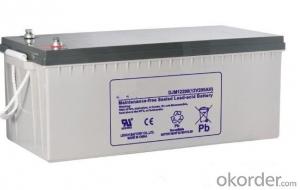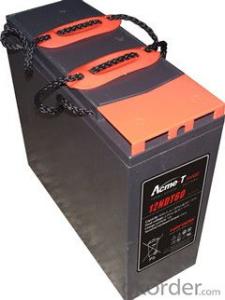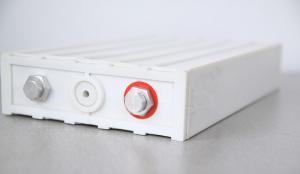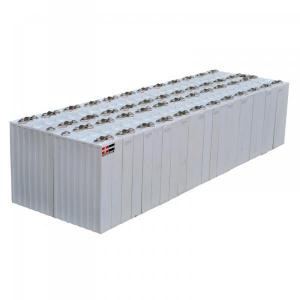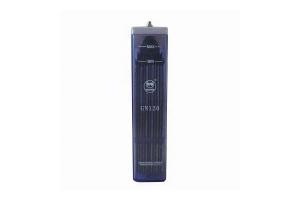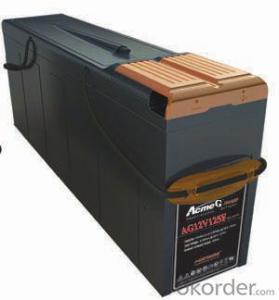VRLA Battery MP Series Battery 6-GFM-100F
- Loading Port:
- Shanghai
- Payment Terms:
- TT OR LC
- Min Order Qty:
- 1000 unit
- Supply Capability:
- 500000 unit/month
OKorder Service Pledge
OKorder Financial Service
You Might Also Like
Range summary:
The MP range VRLA batteries is designed with front terminal structure. The perfect design ensures MP series battery the high reliability and makes the installation quite simple and safe when placed on a standard relay rack tray or in a closed cabinet.
MP range VRLA battery is designed with high energy density and suitable for 19", 23" rack or cabinet, and also offers options of top connection and side of monoblocs connection.Mp range battery can be equipped with central gas collection system according to the requirement of customer.
The MP batteries are ensured the quality with NARADA's QA system according to the ISO9001 standard.
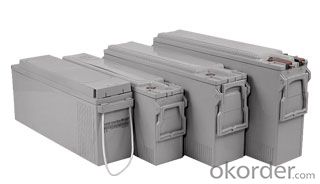
Technical feature:
AGM technology applied in MP range batteries.
Front-access terminal connections for fast and easy installation and maintenance
Suitable for 19", 23" rack or cabinet
Excellent special lead-tin-calcium formula alloy for Grids and plates
Mircoporous glass mats in low resistance as separator
Self-regulating pressure relief valve
12+ years expectant Life under full float service at 25oC(77oF)
Type: | 6-GFM-100F | |
Voltage: | 12V | |
Nominal Capacity: | 100Ah(C10) | 100Ah(10 hours rate:) |
Length: | 558mm | |
Width: | 125mm | |
Height: | 227mm | |
Height with termial: | 227mm | |
Weight: | 37.5Kg |
Compliant standards :
IEC60896-21/22
BS6290 part 4
Telcordia SR4228
Eurobatt guide
UL
Manufactured under system ISO9001(TUV)
Battery installation compliant with:
EN 50272-2 or local equivalents
Main application:
Telecommunications
Uninterruptible power supply (UPS)
Switchgear / utility
Other applications to provide integrated stored energy system
Products characteristics:
Recommended float charge voltage for 12V battery:
2.25Vpc at 25oC(77oF)
Self discharge rate:< 2% per month at 25oC(77oF)
Shelf life: 6 six months at 25oC(77oF)
Valve regulated system, no water addition needed.
FAQ
![]() What is sulfation of batteries?
What is sulfation of batteries?
Sulfation is the formation or deposit of lead sulfate on the surface and in the pores of the active material of the batteries' lead plates. If the sulfation becomes excessive and forms large crystals on the plates, the battery will not operate efficiently and may not work at all. Common causes of battery sulfation are standing a long time in a discharged condition, operating at excessive temperatures, and prolonged under or over charging.
![]() How long a battery can last?
How long a battery can last?
The service design life of a battery are vary considerably with how it is used, how it is maintained and charged, temperature, and other factors.
![]() Do batteries self-discharge when not in use?
Do batteries self-discharge when not in use?
All batteries, regardless of their chemistry, self-discharge. The rate of self-discharge depends both on the type of battery and the storage temperature the batteries are exposed to. However, for a good estimate, Narada batteries self-discharge approximately 4% per week at 80ĄăF.
![]() How can I evaluate the health and charge state of a battery?
How can I evaluate the health and charge state of a battery?
Routine battery examinations divulge irregularities in the charging system as well as in the batteries. The principle method is to examine the electrochemistry of the battery through hydrometric electrolyte inspection. As previously discussed, this important examination cannot be accomplished with sealed absorption or gel batteries. Voltage readings alone require experience to interpret. Hydrometric readings will uncover early warnings of overcharging or overdischarging before batteries are damaged. The state-of-charge and reliability of a lead acid battery can best be determined by the specific gravity of the electrolyte measured directly with a common bulb-type hydrometer with a glass float. We do not recommend the ball float type hydrometer. Specific gravity is a unit of measurement for determining the sulfuric acid content of the electrolyte. The recommended fully charged specific gravity of marine batteries is 1.255 to 1.265 taken at 80ĄăC More than .025 spread in readings between fully charged cells indicates that the battery may need an equalization charge. If this condition persists, the cell is failing and the battery should be replaced. Since water has a value of 1.000, electrolyte with a specific gravity of 1.260 means it is 1.260 times heavier than pure water while pure concentrated sulfuric acid has a specific gravity of 1.835.
- Q: How is the capacity of the battery defined?
- The capacity of the battery unit is AH (safety) is the product of current and time.
- Q: How to deal with waste batteries?
- The rest of the various types of waste batteries are generally shipped to a special toxic, hazardous landfill, but this approach not only cost too much but also cause waste, because there are many useful raw materials available.
- Q: What are the hazards of battery over discharge?
- When the battery discharge current is large, the heat will become more obvious, there will be serious heat generated when the battery deformation, when the concentration of lead sulfate is particularly large, will form a larger crystal particles, that lead to the battery Internal irreversible sulfation.
- Q: What are the advantages of maintenance-free batteries?
- Maintenance-free battery using lead-calcium alloy grille, the amount of water generated when charging less water evaporation is low, with the shell with a sealed structure, the release of sulfuric acid gas is also very little, so with the above advantages.
- Q: What is the meaning of the battery above 12v65Ah?
- 12V is said to be the voltage, 65Ah is the current. (A is the unit of current. H is the time unit .1 hours.)
- Q: How should the battery be well maintained?
- Battery Pile The battery pile head is part of the battery connected to the vehicle. If the corrosion or poor connection occurs, the battery will work poorly. The owner can check whether there is a white powder near the pile head, which is the sign of the pile head corrosion. If the white powder is more, you can use boiling water to burn it off, and then its anti-corrosion treatment, in the pile head smear some grease or preservatives can, but should not be too much to apply, so as not to affect the use.
- Q: What kind of battery is divided into?
- Maintenance-free battery due to its own structure on the advantages of electrolyte consumption is very small, in the life of the basic need not add distilled water. It also has a shock, high temperature, small size, self-discharge characteristics of the general life is generally ordinary Twice the battery. There are two kinds of maintenance-free batteries on the market.
- Q: Battery 200ah / 104 what does that mean?
- Lead-acid battery nominal voltage is 2V / (each or monomer), but in fact will be higher than 2V, so the actual use and charging equipment for the matching will use 104, also useful 103, also useful 108 Only.
- Q: How does battery activation work?
- If the battery is charged, because the battery discharge itself, the active substance to activate, not add acid, but should be added pure water (no minerals and impurities in the water) is best steaming water, and now you Since the addition, you can use water to wash several times, and then use 1C current charge to 2.3 times. Then discharge, so repeated several times, will be better. So that you can remove the vulcanization.
- Q: Lead-acid battery how to maintain?
- When receiving the battery should first check whether the phenomenon of short circuit, first short circuit repair and then fill the distilled water.
Send your message to us
VRLA Battery MP Series Battery 6-GFM-100F
- Loading Port:
- Shanghai
- Payment Terms:
- TT OR LC
- Min Order Qty:
- 1000 unit
- Supply Capability:
- 500000 unit/month
OKorder Service Pledge
OKorder Financial Service
Similar products
Hot products
Hot Searches
